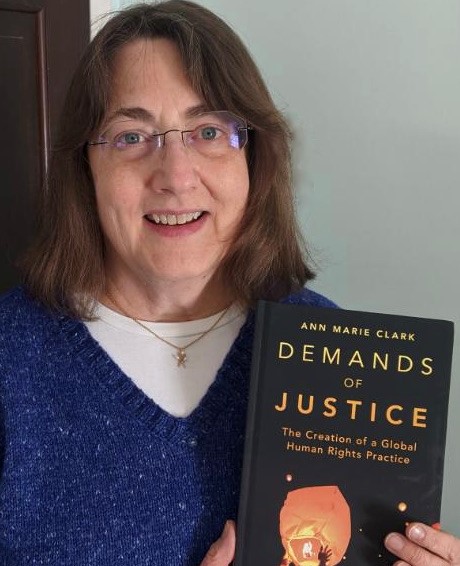Dr. Ann Marie Clark Publishes New Book

Professor Clark’s latest book is Demands of Justice: The Creation of a Global Human Rights Practice (Cambridge University Press, 2022). Drawing on original interviews and archival research, this work traces the evolution of a new international human rights ethos developed by activists in language, law, and practice over the past 50 years. Clark argues that these developments have led to the enrichment of “global justice,” and she takes developments in leading human rights organizations like Oxfam and Amnesty International as illustrative case studies.
Professor Clark’s new book is already being well received among human rights scholars. Shareen Hertel, Professor of Political Science and Human Rights at the University of Connecticut, writes, “This book is a stellar example of the best scholarship on human rights advocacy. Clark explores the ways ordinary people help forge paths to justice, focusing on the evolution of Amnesty International and Oxfam's engagement with advocates and demonstrating the effect that these ‘global helpers' have had on shaping norms and policy outcomes. Demands of Justice offers a rigorous framework for interpreting ongoing struggles (analytical, political, and practical) and centers the voices of advocates themselves in its synthesis.” In the following interview, Professor Clark explains her motivations for writing this book and thoughts on how it fits into her larger research program.
What prompted you to write this book?
A few things:
I was interested in how some of the human rights advocacy techniques that are taken for granted now – like appealing internationally for better treatment of individuals – got started. Many of the people who did this early work are still around, and I also wanted to make sure their contributions are preserved.
Also, I noticed that there has been some convergence in the ways that development groups and human rights groups work, so I wanted to explore that.
Finally, I am interested in understanding how positive change occurs in international politics. I thought that looking at different aspects of human rights as they relate to justice could be a way to learn more about how and why people try to change things for the better.
What are the main points that you think readers should take away from this book?
Human rights has become a way to work for several kinds of justice in the world: first, caring for others; second, pursuing legal accountability, and third, social justice. But the work is not finished. In fact, I argue that the injustices that still exist have provided motivation to think about how to make human rights work better.
How might your book change this field of research?
It shows how political theories about justice are relevant to things people do globally for human rights, and why they do them. The issue of global justice is sometimes overlooked in the field of international politics.
How is this book relevant for today’s political landscape?
I argue that human rights is a very flexible concept and, so far, has evolved with the times. That doesn’t mean we can assume it always will. The evolution is not automatic but has gone hand-in-hand with human ingenuity and persistence in thinking about how to solve problems. The book also suggests that even as individuals, people who care can take small actions that can contribute to justice, but those actions have to be well informed.
How does this book fit in with your larger research program and what comes next?
My next project is about human rights defenders. It investigates how and why established human rights groups, and international law, protect people working on issues at the local level that may be “new” or may fall slightly outside established human rights categories. An example is the way environmental issues affect human rights. Sometimes local people define their human rights concerns differently from the way international law defines human rights, but they are still human rights defenders. This is an interesting legal and political phenomenon, and it is increasingly recognized internationally, so I want to think about how that affects international politics and global justice.
You can find more information about Professor Clark and her work here.